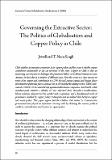|
Reseña:
|
Chile exhibits an immense continuity in its copper policy and the sector’s reliable output contributes enormously to the tax revenues of the state. Copper in Chile is thus an interesting case because it challenges the presumed failure of neoliberal reforms in Latin America. It does this in a number of different ways. First, the sector is a clear success in terms of its output and contribution to GDP. Second, private capital and foreign direct investment in particular plays a critical role in developing the mining sector. Third, state-owned CODELCO has stood firmly against multinational companies. And fourth, Chile simultaneously exhibits a stability of rules inherited from Pinochet’s neoliberalism; labour relations characterized by conflict and co-optation; and a depoliticized mode of governance marked by copper policy technopols and an indirect link between copper and social policy. This paper argues that the Chilean state under La Concertación government has played an important ‘steering’ role by defusing the various political conflicts, contradictions and tensions in copper policy. |

